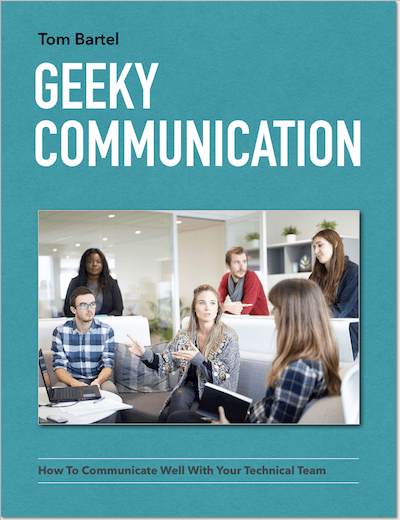“If you want to be understood - listen.” This is the tagline of the movie “Babel” with Brad Pitt and Cate Blanchett (1), but it probably did not take a Hollywood movie to make the saying well-known in one variation or other. I am, by nature, a better listener than a talker, but I still find it necessary to actively remember this saying from time to time, and I think it is something that, in management, is very useful to keep in mind.
Consider the following situation: Carol, an engineering manager, notices that Bill, a developer who joined rather recently, delivers good work, but interacts little with his teammates. He does not share his findings, does not ask for help, and very rarely takes part in team discussions. One day, Carol takes Bill aside, and says: “Bill, I expect you to interact and communicate more. I would like you to share knowledge, ask for help when you need it, and actively take part in team discussions.” Bill seems a bit taken aback, but he nods, and replies: “Hm-hm, I see.” - “All right, gotta go, thanks Bill, see you later.”
Will there be a profound change of behaviour on Bill’s side? Probably not. Basically, what Carol just did was parachute in, saying “You’re doing it wrong, do it this way instead”, and pull out again. If somebody did this to me, I would most likely think: “Where did that come from? She has no clue. What on earth is she basing her conclusions on?”
So, instead, Carol goes back in time and tries something different:
Carol: “Bill, how is it going?”
Bill: “Everything’s good, thanks.”
Ok, seems like Bill is not of the most talkative breed, so Carol has to use more specific questions:
Carol: “How are you feeling in the team?”
Bill: “It’s good. Everybody’s friendly, and I think we are producing good output.”
Carol: “Who do you work together with most, so far?”
Bill: “Hm, I would say Bernard, from time to time. Yes.”
Carol: “Would you say you interact a lot with the team?”
Bill: “Well, yes, we discuss who takes on which tasks, and talk about the status every day, so…“
Carol: “How do you think you are perceived by your teammates?”
Bill: “Well, Bernard was happy when I added the improved caching to the image generation, so I hope I am perceived as a good contributor. Of course, I still have to learn more about the codebase.”
This answer shows Carol that Bill is either not aware of the problem, or he does not want to admit it for some reason. Carol has to bring it up, because he is not going to:
Carol: “I also hear that your work is high quality. But: I have the feeling that you keep to yourself very much, and that you don’t interact with the team a whole lot.”
Bill: “Hm. Could be. I’m not sure. I am rarely the center of attention, you know. But I didn’t get the impression that the team is unhappy with me because of that.”
Carol: “Don’t get me wrong, I want you to be yourself around here, and if you are a rather quiet person, then that’s perfectly fine, of course. However, do you remember last week, when you changed the database schema to make statistics collection possible? That was good work, but a few days later, Sally had to come up with some workarounds because of what you did, when she was implementing the changes in the reporting feature. I think if you had talked your plan through with somebody beforehand, some extra work could have been avoided, and we would have a more coherent schema now.”
Bill: (pauses) “Hm…“
Carol: “Is there a specific reason why you don’t share your thoughts with your teammates that much?”
Bill: “I don’t know, I guess I don’t want to bother them unnecessarily. And I want to show that I can work independently.”
Carol: (remains silent, because she feels that this is not the whole truth)
Bill: “It’s just that, I’m used to working like that. In my previous company, we were kind of competitive about our work, and usually kept to ourselves. We only discussed things if something went wrong.”
Carol: “Which way of working do you prefer? The competitive style of your previous company, or the more communicative style that we advocate here?”
Bill: “I prefer the style you have here.”
Carol: “And do you feel that anybody thinks you cannot work independently?”
Bill: “No, I don’t think so.”
Carol: “I would say the same. I can only speak for myself, but I can clearly see that you can work independently, and I believe I am not the only one. So I ask you to embrace our style of working together, and to become a part of it. I want to see you more engaged with the team, and more proactive in your communication. Do you think you can do that?”
Bill: “Yes, I think I can do that.”
Carol: “Good.”
Bill: “Is there anything else I can do?”
Carol: “Well, apart from that, if you keep up the good quality of your work, that would be great.”
Bill: (smiles) “All right. Thanks, Carol.”
Carol: “Thank you.”
This conversation took maybe five minutes, which is about 4:45 minutes longer than the parachute-in-and-get-out-again solution above. However, Carol achieved a lot in this extra time:
- She made Bill see the problem.
- She learned something about the reasons for his behaviour.
- She reassured him about how he is perceived, so that he knows he does not risk anything by changing his behaviour.
- She got a commitment from him to improve his communication.
Of course, there is no guarantee that Bill will actually change his communication habits, but I would say the probability is much higher than after the first version of Carol’s intervention. Moreover, Bill saw that his manager took some dedicated time to talk to him, get to know him better, and learn about his way of working. This fact alone makes Bill more receptive to suggestions.
The most valuable thing you have to give
Giving your time and attention to someone shows to the other person that you care about her. This is a universal pattern in human behaviour, which already children know instinctively. When I became a dad, I read a few books about parenting, and most of them emphasize how time is the most valuable thing you have to give to your child. By spending time with her, you can build a strong relationship. By building a strong relationship, you increase your influence, and will be able to educate more effectively. The child will be more likely to listen, and also to accept an unpleasant “no” here and there, because she knows that, basically, you mean well and you are on her side.
With adults, it can be a bit more complicated. Diverging interests, antipathy, or caution can get in the way. However, the basic principle is the same: If you have never spent time with someone and have never shown any interest, you will probably have a hard time telling that person what to do. But if the other person knows that you have her best interest at heart, you can even bring up inconvenient topics, and the other person will not dismiss your input right away. Kim Scott gave a good example in an article called Radical Candor. When she was at Google, her own manager, Sheryl Sandberg, frankly told her - in private, of course - that the way she says “um” a lot during presentations makes her sound stupid. That is a harsh statement to make, which is difficult to digest. Many people would simply shut down, and the conversation would be over. However, Kim knew that Sheryl cared about her, because Sheryl had proven that many times before. Therefore, Kim was willing to hear and address the direct criticism she was faced with.
Always ask why
Even when you do not have such a strong relationship like the one between Kim and Sheryl yet, there is something you can do “just in time”. When you enter into a critical feedback discussion with an employee, it is usually a good idea to find out about the reasons for the undesirable behaviour. That’s what Carol, in the initial, parachuting example, did not do, but which she did in the second version. She found out why Bill was reluctant to share knowledge, and thus could show him that his fear was ungrounded.
When Martin does not show up for your 1:1 with him, ask “why” next time. Maybe he was fixing an urgent issue that happened in production, and completely forgot to inform you. When Jack comes in late repeatedly, ask him why. Maybe he takes his kids to daycare, and the opening times changed. When Paula never turns in her reports on time, ask why. Maybe she thinks the reports are a waste of time, and she has a good idea for improving them.
Always ask why, then listen. Your employees are intelligent people, they might be able to teach you something. And even if Paula is wrong about the reports, or if you disagree with her: By listening to her concerns, you will probably increase her acceptance of the fact that the reports are here to stay, and she has to turn them in on time. Intelligent people do not always have to get their way, but they want to be heard, and you should acknowledge their differing opinion.
Finally, if you ask “why”, and there is no good answer, you can still have that critical conversation. Asking first and only then criticizing shows your employee that you give him the benefit of the doubt.
Conclusion
You should not expect to be able to greatly influence people if you do not spend any time with them, or if you do not hear what they have to say. If they do not talk by themselves, make them talk by asking good questions. There is a nice, short video that summarizes some principles from the famous book How to Win Friends and Influence People, and this video illustrates very nicely how showing interest increases your influence.
That said, I think it is a bad idea to fake interest just to be able to influence people. If you cannot muster at least some genuine interest for your employees, then you probably should not be a manager. But if you do have this interest, then show it, make the most of it, and use it to build trust between your employee and you. It will serve you well when you need it.
Footnotes
1. No, the movie is not about JavaScript transpilers
Want to learn more on communication? Check this out:

Yours free: An ebook on effective communication!
Get Geeky Communication absolutely free, and learn about effective communication in a technical environment. Just enter your email address below. No spam ever, guaranteed.
 I'm Tom Bartel, Germany-based software developer, engineering manager, speaker, and human communication geek. More
I'm Tom Bartel, Germany-based software developer, engineering manager, speaker, and human communication geek. More